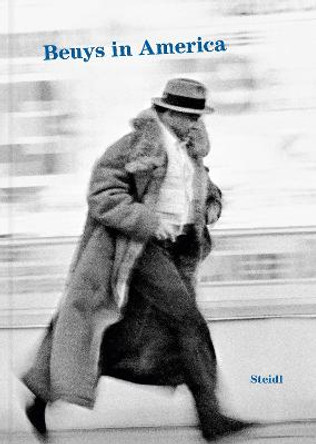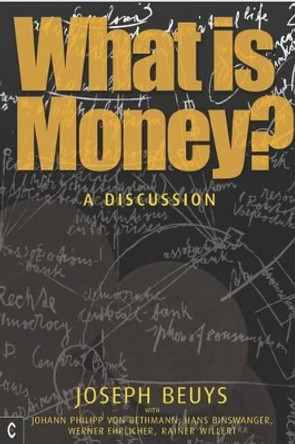Description
About the Author
JOSEPH BEUYS was born in 1921 in Krefeld, Germany. Conscripted into the army, he suffered injuries from several plane crashes. After a period in an English prison camp at the end of the War, he began to study natural science, but disillusioned with its basic tenets he switched to art. From 1947 to 1951 he studied at the Dusseldorf Art Academy with the sculptor Edward Matare. At that time he encountered Rudolf Steiner's work. After years of struggling as an artist and times of deep depression, in 1961 Beuys became Professor of Monumental Sculpture at the Dusseldorf Academy, from which he was expelled in 1972 for challenging the quota system by taking on all students who wanted to learn. During this period he worked with groups like Fluxus whose experimental, interventionist 'events' had much in common with his own strategies and concerns. This lead, from 1965, to Fluxus-festivals and 'happenings', and life-long collaborations with artists like Nam June Paik. Following his first gallery 'action' (a term he coined) in 1965, 'Teaching Paintings to a Dead Hare', Beuys' international reputation grew. He became known for his largely silent actions with substances, creatures and instruments of all kinds, and provocative formulations like 'Every Human being is an Artist' and 'Art=Capital'. He participated in many major international events, including the Venice Biennale, Edinburgh Festival and five Documenta exhibitions from 1964. In 1979 he was honoured with a major retrospective at the Guggenheim Museum, New York. In the '80s there were more exhibitions of Beuys' work than of any other artist, and his influence on younger generations of artists has been extensive. Beuys - alchemist, social visionary and artist - died in 1986, just after receiving the prestigious Lehmbruck Prize. He left behind him not only numerous large-scale installations and site-works, hundreds of provocative multiples and small objects, thousands of drawings (many on blackboards developed as part of 'permanent conference' / dialogue actions), documented social sculpture forums about energy, new money forms and direct democracy, but above all a methodology, 'theory of sculpture', and ideas like 'parallel process' and 'social sculpture'. These ideas - underlying his major social process works such as 'Organisation for Direct Democracy', '7000 Oaks', the 'Free International University' and the 'Honey Pump at the Workplace' - contain unexplored seeds and are a profound basis for new generations of ecological, social process and interdisciplinary practitioners.
Reviews
'An intimate dialogue with Joseph Beuys, arguably the most important and radical artist of the late twentieth century, which takes us into the deeper motivations and understandings underlying 'social sculpture' and his expanded conception of art.' - Shelley Sacks, Artist and Director of the Social Sculpture Research Unit, Oxford Brookes University 'It is arguable that Beuys was the first artist of the twenty-first century. Like Rudolf Steiner, he was passionately concerned with the history of ideas and the points of interface between manifestations of the arts and sciences as well as philosophy, religion, economics and politics.' - Richard Demarco, OBE, Professor Emeritus, European Cultural Studies, Kingston University, Surrey 'Joseph Beuys was one of the most important artists of the twentieth century. He was one of the first German artists to engage with his country's turbulent and destructive recent history. His art embraced processes of political renewal within society, the search for an appropriate spiritual approach in our times, and a belief in the creative potential in each individual.' - Sean Rainbird, Senior Curator, Tate Collection 'Twenty years after his death, Beuys is still the most inspirational artist of modern times. No other figure has so moved people to find their own creativity and to innovative solutions to the biggest environmental threats facing our planet.' - Professor Caroline Tisdall, Oxford Brookes University 'The revolutionary artistic ideas and artwork of Joseph Beuys are still, decades later, one of the strongest influences on contemporary artists. His work bursts open the enclosed world of visual art to encompass political and social reform, environmentalism, education, economics, spiritual science, and the proposal that art is not properly an activity for "experts" but for everyone.' - David Adams, Ph.D., Art History faculty, Sierra College, California 'Joseph Beuys was the most significant artistic innovator of the twentieth century. His extended concept of art and his Social Sculpture Theory contain the seeds needed for addressing the root problems of our global society today. Harlan's book is a seminal contribution to the understanding of Beuys' work.' - Otto Scharmer, co-author, Presence: Human Purpose and the Field of the Future, Lecturer, MIT Sloan School of Management
Book Information
ISBN 9781905570072
Author Joseph Beuys
Format Paperback
Page Count 128
Imprint Clairview Books
Publisher Clairview Books







